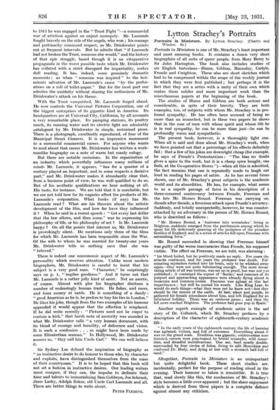Lytton Strachey's Portraits
Portraits in Miniature is one of Mr. Strachey's least important and most amusing books. It contains a dozen very short biographies of all sorts of queer people, from Mary Berry to Sir John Harington. The book also includes studies of six English historians—Hume, Gibbon, Macaulay, Carlyle, Froude and Creighton. These also are short sketches which had to be compressed within the scope of the weekly journal in which they were first published ; but perhaps it is the fact that they are a series with a unity of their own which makes them solider and more important work than the miscellaneous papers at the beginning of the book.
The studies of Hume and Gibbon are both serious and considerable, in spite of their brevity. They are both examples, too, of subjects with whom Mr. Strachey is in pro- found sympathy. He has often been accused of being no more than an iconoclast, but in these two papers he shows that in the case of men with whose spirit and whose life he is in real sympathy, he can be more than just—he can be profoundly warm and sympathetic.
The present book, however, is a thoroughly light one. When all is said and done about Mr. Strachey's work, when we have pointed out that a percentage of his effects definitely fail ; that a few of his jokes are downright cheap (for example, he says of Froude's Protestantism : "The bias no doubt gives a spice to the work, but it is a cheap spice bought, one feels, at the Co-operative Stores ")—when all this-is admitted, the fact remains that one is repeatedly made to laugh out loud in reading his pages of satire. As he has several times shown, one of Mr. Strachey's great subjects is the academic world and its absurdities. He has, for example, what seems to us a superb passage of farce in his description of a three-cornered controversy between Froude, Freeman and the late Mr. Horace Round. Freeman was carrying on, decade after decade, a ferocious attack upon Froude's accuracy. Suddenly, and totally unexpectedly, however, he was counter- attacked by an adversary in the person of Mr. Horace Round, who is described as follows :
" Mr. Horace Round, a burrower into wormholes ' living in Brighton, suddenly emerged from the parchments among which he spent his life deliciously gnawing at the pedigrees of the proudest families of England, and in a series of articles fell upon Freeman with astonishing _force."
Mr. Round succeeded in showing that Freeman himself was guilty of far worse inaccuracies than Froude, his supposed victim. The effect on Freeman, we are told, was alarming :
" his blood boiled, but he positively made no reply. For years the -attacks continued, and for years the professor -was - dumb. Ful- minating rejoinders rushed into his brain, only to be whisked away again—they were not quite fulminating enough. The most devas- tating article of all was written, was set up in proof, but was not yet published ; it contained the exposi of ' Senlac,' and rumours of its purport and approaching appearance were already flying about in museums and common-rooms. Freeman was aghast at this last impertinence ; but still he nursed his wrath. Like King Lear, he would do such things—what they were yet he knew not—but they should be the terrors of the earth. At last, - silent and purple, he gathered his female attendants about him, and left England for an infuriated holiday. There was an ominous pause ; and then the fell news reached Brighton. ' The professor had gone pop in Spain."
Another superb example of academic satire is the sad story of Dr. Colbatch, which Mr. Strachey prefaces by a description of the character of eighteenth-century academic life : " In the early years of the eighteenth century the life of learning was agitated, violent, and full of extremes. Everything about it was on the grand scale. Erudition was gigantic, controversies were frenzied, careers were punctuated by brutal triumphs, wild tomer- ities, and dreadful mortification. One sat, bent nearly double. surrounded by four circles of folios, living to edit Hesychius and confound Dr. Hody, and dying at last with a stomach half-full of sand."
Altogether, Portraits in Miniature is an unimportant but quite delightful book. These short studies. are, incidentally, perfect for the purpose of reading aloud in the evening. Their humour so taken is irresistible. It is true that, read slowly like this, the mechanism of Mr. Strachey's style becomes a little over-apparent ; but the-sheer enjoyment .which is derived from, these papers is a complete defence against almost any criticism..






































 Previous page
Previous page